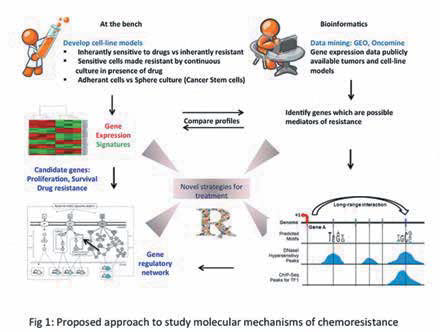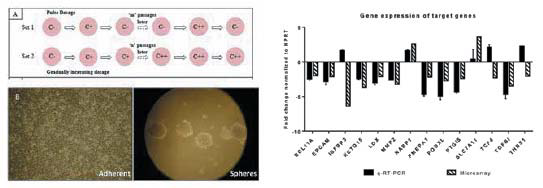
Centre for Human Genetics
Bangalore.

Bangalore.

Prathibha Ranganathan
Visit My Profile
PhD, Indian Institute of Science, Bengaluru
Post-Doctoral Fellowship, University of Miami, USA
Cancer is a disease that claims thousands of lives every year throughout the world. Despite several advances in medicine, the disease continues to pose severe challenges to patients, clinicians and researchers. One of the major problems in treatment of cancer is resistance to therapy, which may be inherent or acquired. Besides, there are tumourintrinsic and tumour-extrinsic (tumour microenvironment) factors that influence response to therapy. My group is interested in understanding
molecular mechanisms responsible for development of resistance to chemotherapy. We use a combination of bioinformatics, genomics, and molecular and cell-based approaches to understand the reasons for resistance to chemotherapy using lung cancer as a model (Fig. 1). We are also trying to understand the role of epithelial to mesenchymal transition in development of resistance to therapy.A comprehensive insight into the signalling andepigenetic changes leading to a resistant phenotype may aid in development of better therapeutic strategies.
 The overall goal is to be able to identify better ways of disease management such as combinatorial therapy. We are trying to develop molecular and cell-based assays, which can be used to test the efficacy of various combinations of drugs and thus may have the potential to be used as a predictive tool to decide the course of therapy for patients.
We have developed cell-based models to study chemoresistance (Fig. 2). These models are being characterised for their gene expression patterns, epigenetic changes and alterations in signalling pathways (Fig. 3). We are also developing an assay to identify compounds (pharmacological inhibitors, natural derivatives, etc.) which can delay or prevent onset of therapeutic resistance.
The overall goal is to be able to identify better ways of disease management such as combinatorial therapy. We are trying to develop molecular and cell-based assays, which can be used to test the efficacy of various combinations of drugs and thus may have the potential to be used as a predictive tool to decide the course of therapy for patients.
We have developed cell-based models to study chemoresistance (Fig. 2). These models are being characterised for their gene expression patterns, epigenetic changes and alterations in signalling pathways (Fig. 3). We are also developing an assay to identify compounds (pharmacological inhibitors, natural derivatives, etc.) which can delay or prevent onset of therapeutic resistance.

Fig 2: A: Scheme for developing drug resistant sub-lines of lung cancer cells B: Adherent vs Sphere culture (as a model for drug resistant cells)
Fig 3: qRT-PCR validation of selected differentially expressed genes
Endocrine therapy is a mode of therapy given in cancers like breast cancer and prostate cancer,which are hormone-dependent cancers. Although it is very effective in the initial stages, these cancers eventually develop resistance to endocrine therapy.Our lab is trying to understand the reasons for development of endocrine resistance in breast and prostate cancers.
Selected publications:
1.Notch represses transcription by PRC2 recruitment to the ternary complex.Molecular Cancer Research, 15: 1173-1183 (2017).Han X, Ranganathan P, Tzimas C, Weaver KL, Jin K, Astudillo L, Zhou W, Zhu X, Li B, Robbins DJ, Capobianco AJ
2.Notch signaling drives stemness and tumorigenicity of esophageal adenocarcinoma. Cancer Research, 74: 6364-6374 (2014). Wang Z, Da Silva TG, Jin K, Han X, Ranganathan P, Zhu X, Sanchez-Mejias A, Bai F, Li B, Fei DL, Weaver K, Vasquez-DelCarpio R, Moscowitz AE, Koshenkov VP,Sanchez L, Sparling L, Pei XH, Franceschi D, RibeiroA, Robbins DJ, Livingstone AS, Capobianco AJ
3.Triple negative breast cancer initiating cell subsets differ in functional and molecular characteristics and in ł-secretase inhibitor drug responses. EMBO Molecular Medicine,5: 1502- 1522 (2013).Azzam DJ, Zhao D, Sun J, Minn AJ, Ranganathan P, Drews-Elger K, Han X, Picon-Ruiz M, Gilbert CA, Wander SA, Capobianco AJ, El-Ashry D, Slingerland JM
4.Notch signalling in solid tumours: a little bit of everything but not all the time. Nature Reviews Cancer, 11: 338-351 (2011). Ranganathan P, Weaver KL, Capobianco AJ
5.Expression profiling of genes regulated by TGFbeta: Differential regulation in normal and tumour cells. BMC Genomics, 8: article number 98 (doi: 10.1186/1471-2164-8-98) (2007).Ranganathan P, Agrawal A, Bhushan R, Chavalmane AK, Kalathur RKR, Takahashi T, Kondaiah P
Copyright © 2011 - All Rights Reserved - Taurus Hard Soft Solutions Pvt. Ltd
Stay Up to Date With Whats Happening